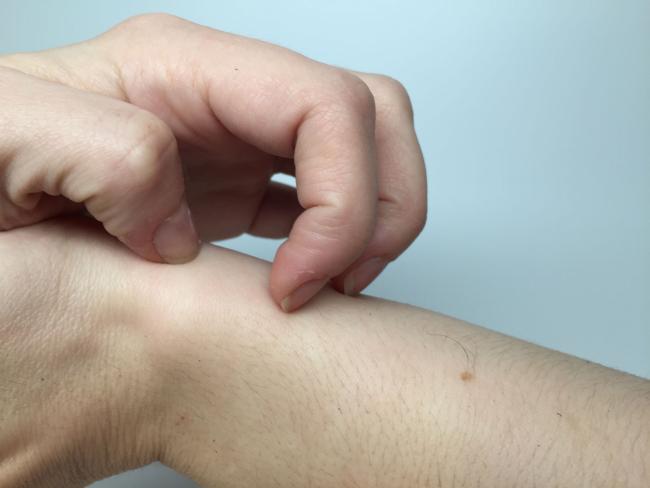Scratching the skin primes the gut for allergic reactions to food, mouse study suggests
Media Advisory Tuesday, April 23, 2019
Scratching the skin primes the gut for allergic reactions to food, mouse study suggests
NIH-funded research illuminates relationship between eczema and food allergy.

What
Scratching the skin triggers a series of immune responses culminating in an increased number of activated mast cells — immune cells involved in allergic reactions — in the small intestine, according to research conducted in mice. This newly identified skin-gut communication helps illuminate the relationship between food allergy and atopic dermatitis (a type of eczema), a disease characterized by dry, itchy skin. The study was supported by the National Institute of Allergy and Infectious Diseases (NIAID), part of the National Institutes of Health, and led by researchers at Boston Children’s Hospital.
Atopic dermatitis is a strong risk factor for developing food allergy, but the precise relationship between the two conditions remains unclear. As itching is a major symptom of atopic dermatitis, people with the disease, particularly babies, often scratch their skin. The current study proposes that scratching the skin instigates mast-cell expansion in the intestine.
The researchers found that some cells in the skin respond to scratching — simulated by applying and removing small strips of tape on the skin of mice — by producing a cell-signaling protein called IL-33, which enters the bloodstream. When IL-33 reaches the gut, it works in concert with IL-25, a protein secreted by cells in the lining of the intestine, to activate type 2 innate lymphoid cells (ILC2s). Activated ILC2s make two additional cell-signaling proteins, IL-13 and IL-4, which were found to be responsible for the expansion of intestinal mast cells.
The researchers also found that as mast cells expanded, the intestinal lining became more permeable, making it easier for allergens to enter the tissues. Notably, mice that underwent tape stripping had more severe reactions to food allergen than mice that did not. Finally, the researchers found that intestinal biopsies from four children with atopic dermatitis contained more mast cells than those from four children without the condition.
Although additional work is needed to determine the relevance of the findings to humans, the researchers suggest that interventions to limit itching potentially could lessen the severity of food allergy among people with atopic dermatitis.
Article
J-M Leyva-Castillo, C Galand, et al. Mechanical skin injury promotes food anaphylaxis by driving intestinal mast cell expansion. Immunity DOI: 10.1016/j.immuni.2019.03.023 (2019).
Who
Wendy Davidson, Ph.D., a program officer in the Allergy, Asthma, and Airway Biology Branch in NIAID’s Division of Allergy, Immunology, and Transplantation, and Alkis Togias, M.D., chief of the same branch, can comment on the research.
Contact
To schedule interviews, please contact Hillary Hoffman, (301) 402-1663, hillary.hoffman@nih.gov.
This media availability describes a basic research finding. Basic research increases our understanding of human behavior and biology, which is foundational to advancing new and better ways to prevent, diagnose, and treat disease. Science is an unpredictable and incremental process — each research advance builds on past discoveries, often in unexpected ways. Most clinical advances would not be possible without the knowledge of fundamental basic research.
NIAID conducts and supports research — at NIH, throughout the United States, and worldwide — to study the causes of infectious and immune-mediated diseases, and to develop better means of preventing, diagnosing and treating these illnesses. News releases, fact sheets and other NIAID-related materials are available on the NIAID website.
About the National Institutes of Health (NIH): NIH, the nation's medical research agency, includes 27 Institutes and Centers and is a component of the U.S. Department of Health and Human Services. NIH is the primary federal agency conducting and supporting basic, clinical, and translational medical research, and is investigating the causes, treatments, and cures for both common and rare diseases. For more information about NIH and its programs, visit www.nih.gov.
NIH…Turning Discovery Into Health®
Institute/Center
Contact
301-402-1663


